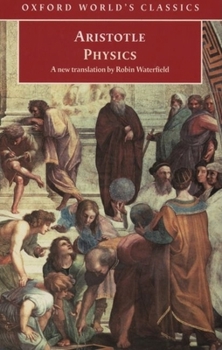Book Overview
For many centuries, Aristotle's Physics was the essential starting point for anyone who wished to study the natural sciences. Now, in the first translation into English since 1930, Aristotle's thought is presented accurately, with a lucid introduction and extensive notes to explain the general structure of each section of the book, and shed light on particular problems. It simplifies and expands the style of the original, making for easier reading...
Format:Paperback
Language:English
ISBN:0192835866
ISBN13:9780192835864
Release Date:September 1999
Publisher:Oxford University Press, USA
Length:384 Pages
Weight:0.60 lbs.
Dimensions:0.8" x 7.4" x 5.1"
Customer Reviews
3 ratings
What is The Meaning Of Being?
Published by Thriftbooks.com User , 16 years ago
I read this book for a graduate seminar on Aristotle. PHYSICS--Aristotle addresses the "why" questions. Aetia= causes, there are 4 causes. Only 1 cause actually sounds what like we call a cause today. A better translation is "explanation." 4 ways to explanations. Arche=origins/principles, something that is 1st, or rule, or, commanding, or beginning. Thus 1st thought that leads us to understand something and how we proceed. Begin how we think and rule or govern how we think. Phusis= "nature," like physics. He understands nature differently than we do today. For Aristotle the planets orbits never change so not part of nature. Everything below the moon, "lunar," is nature. Thus everything below lunar is not perfect and goes through change. Phusis root= to grow or bloom. Thus, emerging like birth. This term has to do with movement and change. Also connected to "coming to light." Also, connected to "being." Physics (nature) is an arche (rule) of motion and change. Concept of physics (nature) has to do with motion and change. Paramedes denies change. Aristotle takes umbrage with this. Plato says change is a deficient condition; Aristotle is against both men's notion of change. IMPORTANT--Aristotle talks about how we talk about how we talk about change all the time. Aristotle says no such things as "being" itself. For Aristotle there is change we always talk about it. Potentiality and actuality- 2 terms that dominate Aristotle's thinking. Change is potentiality to actuality. Potentiality is a "not yet." He criticizes premises of philosophers for denying or denigrating change. His physics is his thought to explain change. Ousia can't mean something unchanging, it is always a changing phenomena. For Aristotle and the Greeks the "world" has no beginning or end it is always here. No God or creator. Big and small are opposites, but are only conceptual. Small things become big Aristotle sees this. Our language is the guide here. The fact that there is change doesn't mean it is chaotic, you plant a seed, and it grows from small to big, this is normal change. 3 senses Aristotle uses phusis or nature. IMPORTANT- 1. "Always or for the most part." 2. Telos-end, purposes. 3. Movement is self-generated toward something. When a seed falls to the ground it grows and moves towards growing. Contrast Phusis with techne="produce something by humans." Both have to do with change and movement. 1 is self-moving, 1 is moved by us. Trees are not brought into being by themselves; beds out of trees are made by us. What is a bed? For Aristotle it has no nature or physics, it can have an essence. Everything other than Techne "things of production" are physics, nature. It is natural that humans have productive capacity and skills. Techne and physics are distinguished to understand change. Aristotle is important in philosophy and science because he uses language of science. He sees that change is internal within phusis in
Readable Aristotle is not an oxymoron.
Published by Thriftbooks.com User , 17 years ago
I found this translation easier to read than other translations of Aristotle. It is much easier to unpack and follow, only the content needs to be wrestled with, which is a project in and of itself. It includes the Becker numbers, which makes it easier to have a discussion with a group.
Ancient Philosophy at its Best
Published by Thriftbooks.com User , 23 years ago
Aristotle's Physics is a brilliant compilation of his notes that he lectured from. This translation is stunning, with lots of commentaries and clarifications. This book encompasses everything from space, biology, potentiality, being, and luck, and much more. Whether reading for knowledge or pleasure, I would recommend this book.





